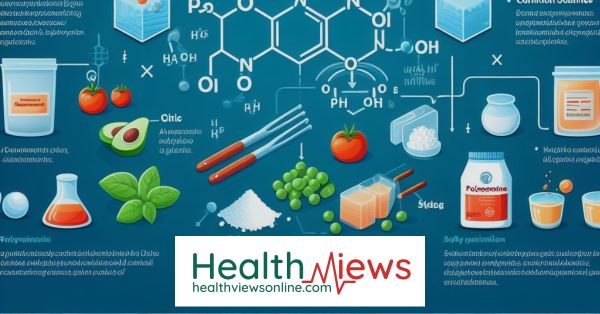In the realm of processed foods, emulsifiers play a crucial role in creating stable and appealing food products. Polysorbates, a group of synthetic emulsifiers, are commonly used in various processed foods to improve texture, consistency, and shelf life. While they are generally considered safe for consumption, concerns have been raised about their potential health effects. This article aims to provide a comprehensive understanding of Polysorbates, including their definition, sources, applications, associated risks, regulatory status, and strategies for minimizing exposure. (Source)
What is Food Emulsifier Polysorbates?
Polysorbates are a group of synthetic emulsifiers derived from sorbitol, sugar alcohol, and fatty acids derived from vegetable oils. They are amphiphilic molecules, meaning they have both hydrophilic (water-attracting) and lipophilic (fat-attracting) properties, which allow them to stabilize mixtures of oil and water in processed foods. (Source)
What are the Sources of Polysorbates?
Polysorbates are synthesized through the esterification of sorbitol with fatty acids derived from vegetable oils such as palm oil or coconut oil. They are produced in a controlled laboratory environment to ensure purity and consistency. (Source)
What is the List of Foods Containing Polysorbates?
Polysorbates can be found in a variety of processed foods and beverages, including:
- Salad dressings and mayonnaise
- Ice cream and frozen desserts
- Bakery products such as cakes and cookies
- Processed cheese and cheese spreads
- Margarine and spreads
- Creamy sauces and gravies
- Dessert toppings and whipped cream substitutes
Why is Emulsifier Polysorbates Used in the Food Industry? What are the Applications
Polysorbates serve as versatile emulsifiers in the food industry by:
- Improving the stability and uniformity of emulsions, preventing separation of oil and water phases in food products.
- Enhancing texture and mouthfeel, providing a smooth and creamy consistency to various processed foods.
- Extending the shelf life of products by inhibiting the growth of spoilage microorganisms and preventing rancidity in fat-containing foods.
- Facilitating the dispersion of flavor and color compounds, ensuring even distribution throughout the food matrix.
The Risky and Harmful side effects of Polysorbates on Human Health are:
While Polysorbates are generally recognized as safe (GRAS) by regulatory agencies when consumed within recommended levels, some individuals may experience adverse reactions, including:
- Gastrointestinal discomfort: Ingesting large amounts of Polysorbates may lead to digestive issues such as bloating, gas, or diarrhea, particularly in individuals with sensitive digestive systems. (Source)
- Allergic reactions: Although rare, allergic reactions to Polysorbates have been reported, manifesting as skin rash, itching, or respiratory symptoms in susceptible individuals. (Source)
- Potential impact on gut microbiota: Some research suggests that Polysorbates may disrupt the balance of gut bacteria and contribute to intestinal inflammation, although further studies are needed to confirm these findings. (Source)
What are the FDA regulations for Emulsifier Polysorbates?
The U.S. Food and Drug Administration (FDA) regulates the use of Polysorbates as food additives and considers them Generally Recognized as Safe (GRAS) when used within specified limits. The FDA sets strict guidelines for the allowable levels of Polysorbates in food and beverage products to ensure consumer safety. (Source)
List of Diseases Associated with High Polysorbates Levels:
Consuming excessive amounts of Polysorbates may lead to various health concerns, including:
- Gastrointestinal disorders: Excessive intake of Polysorbates may disrupt normal digestive function and contribute to gastrointestinal discomfort, including bloating, gas, and diarrhea.(Source)
- Inflammatory bowel disease (IBD): Some studies suggest that Polysorbates may exacerbate symptoms of IBD, such as Crohn’s disease and ulcerative colitis, by promoting inflammation in the gastrointestinal tract. (Source)
- Metabolic syndrome: Animal studies have suggested that high doses of Polysorbates may contribute to metabolic syndrome, insulin resistance, and obesity, although further research is needed to establish causality. (Source)
How to Minimize the Exposure to Food Emulsifier Polysorbate?
To minimize potential risks associated with Polysorbate consumption, consider the following recommendations:
- Read food labels carefully and be aware of products containing Polysorbates, particularly if you have a history of digestive issues or food allergies.
- Limit consumption of processed foods containing high levels of Polysorbates and opt for whole, minimally processed foods whenever possible.
- Be mindful of portion sizes and moderate your intake of Polysorbate-containing products to reduce the risk of adverse effects on digestive health.
- Consult with a healthcare professional if you experience persistent gastrointestinal symptoms or allergic reactions after consuming Polysorbate-containing foods.
In conclusion, Polysorbates play a critical role in the formulation and stability of many processed foods, but their safety and potential health effects warrant careful consideration. By understanding their sources, applications, associated risks, and regulatory considerations, consumers can make informed choices to promote their health and well-being.

Also, read: All You Need to Know about Food Emulsifier Mono- and diglycerides
Sources and References:
- U.S. Food and Drug Administration (FDA)
- European Food Safety Authority (EFSA)
- National Institutes of Health (NIH)
- World Health Organization (WHO)
- Food and Agriculture Organization of the United Nations (FAO)
- Scientific journals and peer-reviewed research articles.




